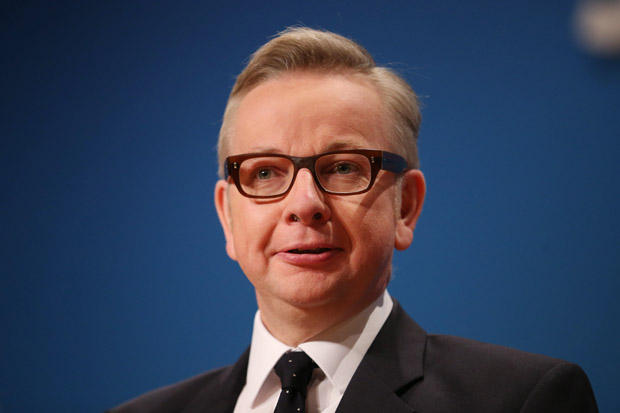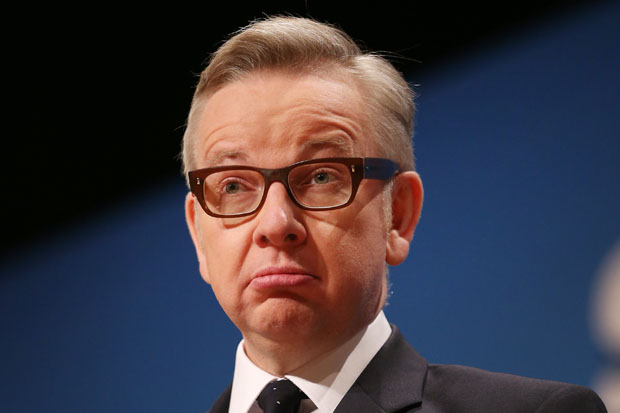Lately, people only have to look at me to splurge their deepest, darkest secret. Last May, they did a terrible thing. They voted Tory. Now they’re contemplating greater deviance: voting to leave the EU — if only, they say, the campaign was fronted by someone they could believe in. And who do they want? The answer surprised me. Theresa is no temptation, as it turns out, nor even Boris. No, it’s Michael Gove they fancy.
Westminster types might read this and splutter, ‘What tosh! If there’s one thing we know about the British public, it’s that they hate him.’ But these are the experts who failed to predict the outcome of the general election. Whereas I was sure the Tories would win, simply from talking to my relatives.
First, my state-school-teacher mother voted Tory in homage to Gove, since his education reforms had restored her faith in teaching. The party may have knifed her hero, but still it was the right thing to do. Then my father went all gooey-eyed and started saying weirdly positive things about ‘Dave’.
Then my brother, who works at the BBC, in the heart of socialist Salford, registered to vote for the first time, at the grand old age of 29, to go blue. My friends began to mutter: ‘Cameron may look like a smarmy git but he’s done a bloody good job.’
Shy Toryism among the lower classes isn’t new. It’s a tendency rife among people who don’t like to have their intelligence insulted (and that’s why they don’t like the ‘in’ campaign one little bit). It has existed, to my certain knowledge, since the 1960s, when my working-class, Irish Catholic great-grandmother was rumoured to have included ‘voting Conservative’ in her deathbed confession. Pollsters also called the election result wrong in 1987 and 1992. It was best, socially speaking, to say you’d vote for Kinnock — but potentially suicidal to your self-interest.
When it comes down to it, working-class and lower-middle-class voters are not so foolish as to cast their vote according to who they’d like to share a pint with. They vote for the leader most likely to keep them in a job, deliver decent healthcare and educate their children properly.
And that latter part is why they appreciate Gove. During the election campaign, Lynton Crosby kneecapped and buried him, believing him to be ‘toxic’ to the Tory brand. Thanks to social media, it was believed that voters didn’t want to vote Conservative and absolutely hated Gove, so they ought not to be reminded of his existence. But social media is rife with virtue-signalling. The majority were either silent about their true voting preference — or lying for show.
Teachers may genuinely still despise Michael Gove (although he has his secret admirers). But even so, for every teacher who hates him, there is quite likely a class of more than 30 children whose parents passionately agree with him. They know what Gove knows (and are grateful that he had the balls to state it): it is wrong, plain wrong, that 7 per cent of the population will always rise to the top of society and stay there while the remaining 93 per cent are left to languish in bad comprehensives — not being taught proper grammar or how to add up without a calculator (as I wasn’t).
He was right to restore rigour to teaching, to hope that Oxbridge would fill up with state-school kids (and to insist they’ll get there on merit alone). ‘London schools have been transformed in the past few years — even Labour admits that,’ adds another of my friends, wrestling a Gove flirtation.
Gove understands shy Tories because he grew up in a Labour-voting household in granite-grey Aberdeen. Unlike the Eton lot, whose success strikes the rest of us as dispiritingly inevitable; Gove was adopted at four months old by middle-class parents, and got to Oxford by virtue of being clever and working very hard.
It is this cleverness, and his refusal to hide it, that endears him to voters tired of being patronised. Gove never pretends to be cool. His wife, the columnist Sarah Vine, ribs him very entertainingly in the newspapers, ensuring that he never comes across as phony. (‘My husband got terribly excited when he discovered that Wagner was in the X Factor finals, and subsequently disappointed to discover this didn’t mean Parsifal on ITV but a bare-chested 18-stone Brazilian pop singer with the hair of the Little Mermaid, the voice of Engelbert Humperdinck and the jewellery of Gerald Ratner.’)
But what shy Tories particularly like about Gove is that he does this totally revolutionary thing: he thinks. And once he’s decided what to do, he sticks. He is in many ways reminiscent of that other violently unpopular education secretary. The one who cancelled all the free milk, and was duly re-elected years later by hordes of grateful state-school children, so liberated. (My uncle used to have to drink his by the sink, because he sicked it up afterwards.)
Thatcher didn’t talk down to shy Tories either — but she knew how to woo them. Thrusting, petit bourgeois to her bones, she knew instinctively: no, not everyone wants to live in the condition to which they were born. And yes, they do want the right to buy their own council houses, thank you very much. Such creative insight won her three elections. And all the time, her secret, shame-faced supporters publicly professed to hate her guts.
‘When I’m out of politics I’m going to run a business,’ Mrs T. once said. ‘It’ll be called rent-a-spine.’ In a milieu sadly deficient in backbone, Gove has proved he is vertebrate.
For myself, I’m so disillusioned that I never dream of voting Tory. I just stand in the polling booth, wondering how best to spoil my ballot. But at heart, I’m a girl from a dull town who wanted to make something of her life. So if next time, there’s a box to cross for Gove, I know I couldn’t resist… and I wouldn’t lie about it, either.
Got something to add? Join the discussion and comment below.
Get 10 issues for just $10
Subscribe to The Spectator Australia today for the next 10 magazine issues, plus full online access, for just $10.
You might disagree with half of it, but you’ll enjoy reading all of it. Try your first month for free, then just $2 a week for the remainder of your first year.















Comments
Don't miss out
Join the conversation with other Spectator Australia readers. Subscribe to leave a comment.
SUBSCRIBEAlready a subscriber? Log in